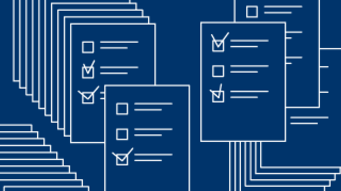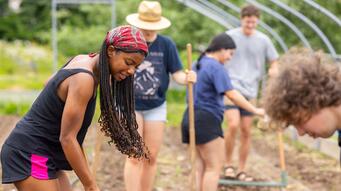Empowerment
A more open, connected, and innovative Yale
Yale welcomes all voices in fostering a diverse and inclusive sustainability movement.
Yale’s Efforts
- Yale alumni become champions for sustainability in all sectors. Yale Blue Green is a shared interest group for alumni who are engaged in sustainability issues and eager to connect with each other.
- Professional schools and departments across the University host Green Teams to pilot new initiatives and develop Sustainability Action Plans.
What You Can Do
- Join a Yale Affinity Group or Cultural Center and promote the connection between sustainability and social justice. Review the guide to learn more about these connections.
Our Objectives and Goals
Engage and Empower
Engage and empower members of the Yale community around themes of sustainability
Every year, Yale faculty and students focus on critical social questions facing New Haven—from the public health implications of evictions to urban heat stress. Last year, for the first time, this research was published in a centralized location when the Yale Center for Environmental Justice launched the New Haven People and the Environment Research Library (PERL), a searchable website that houses a broad array of information at the intersection of people and the environment. Funded by a grant from Yale Planetary Solutions, PERL aims to make research about New Haven more accessible to its residents, with more than 200 studies and reports already posted.
Sustainability Action Plans
By 2020, create and implement sustainability action plans for key academic, cultural, and administrative Yale departments to support the ambitions of the Yale Sustainability Plan 2025.
This goal was achieved in 2020 and resulted in the creation of more than thirty action plans for Yale academic, cultural, and administrative units as a tool for individual departments to contribute to broader institutional goals. Development of the action plans included active engagement at the professional school and unit level, a process that entailed robust and dedicated effort. Different approaches to engagement are now being explored, using lessons learned from the action planning process.
Sustainability Literacy
By 2020, develop and launch a sustainability literacy initiative for Yale students, faculty, and staff that assesses and improves sustainability awareness and empowers action.
This goal was achieved in 2020 with the development and launch of a recurring university-wide sustainability survey and programming informed by these data. Survey findings are also regularly shared and integrated into meetings to help shape strategies and drive progress. The next survey intends to measure progress and will evolve to reflect broader institutional efforts.
Support Diversity and Inclusion
Support diversity and inclusion in local efforts through education and collaboration
Sustainability Inclusion and Justice Initiative
By 2018, launch an initiative to promote dialogue about sustainability, inclusion, and justice on campus and in New Haven.
This goal was achieved in 2020 when a subcommittee of Yale students and employees investigated tools to integrate diversity, equity, and inclusion into sustainability programming. Research centers, including the Yale Justice, Equity, Diversity, and Sustainability Initiative and the Yale Center for Environmental Justice (YCEJ), offer opportunities to advance connections between sustainability and climate justice at all levels. Last year’s launch of the New Haven People and the Environment Research Library by YCEJ furthered this goal by making more than 200 Yale studies and reports on topics relevant to New Haven publicly available in one place for the first time.
Applying an Intersectional Lens to Sustainability Programming
Since 2020, the Office completes an annual Co-benefit Assessment to track the impacts of our goals pertaining to community well-being and social, environmental, and economic resilience. The Office will report annually on the results of this assessment and progress made from year to year.
Rather than look back at one year of progress, as all previous assessments have done, the 2025 cobenefit assessment is a reflection of progress made throughout the nine-year Yale Sustainability Plan 2025. Results of the assessment show that sixteen goals had at least one major cobenefit, 35 goals had at least one moderate cobenefit, and two goals had solely neutral cobenefits.







